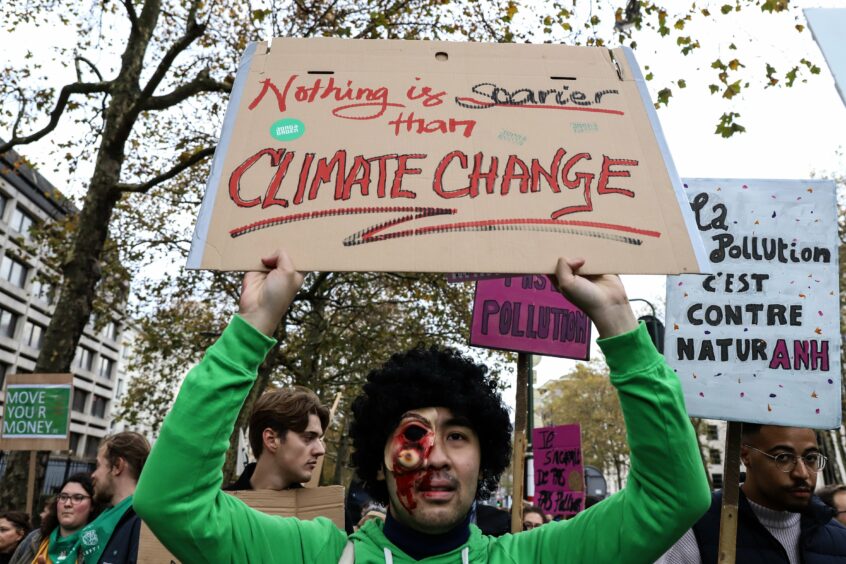
A judicial review decision in Scotland’s Court of Session over the summer provides further evidence of a growing wave of post-COP26 challenges to governments over their commitment in delivering on net zero pledges.
North Lowther Energy v Scottish Ministers raised arguments about whether Scottish ministers had proper regard to their legal obligations arising from the Climate Change (Scotland) Act 2009, the Climate Change (Emissions Reduction Targets) (Scotland) Act 2019 and related Scottish Government policy commitments in their refusal to grant consent for a wind farm development in Dumfries and Galloway.
The court concluded that while both Scottish Parliamentary legislation and Scottish Government policy are important considerations in the consenting process, the weight each factor should be given was for the decision maker’s judgment.
In North Lowther the decision maker had given more weight to visual impact than climate implications. The applicant was disadvantaged by having to rely on current planning policy, which gives climate targets no automatic priority status. However, when the new National Planning Framework 4 comes (a final draft is due to be put before the Scottish Parliament for approval this year) it may change that approach, possibly increasing opportunities for activists, NGOs and other interested parties to press authorities in Scotland to ‘walk the walk’ on all aspects of climate change policy.
These policy changes are arguably inevitable, in the wake of the most recent Intergovernmental Panel on Climate Change (IPCC) report concluding that climate change poses an ‘unequivocal’ threat to human well-being. The grim view of the IPCC – one that has been further amplified during another summer of extreme weather events, is that human-induced climate change is already affecting every region across the globe.
In July, when the UK faced its hottest-ever temperatures on record, another climate change-related court challenge was unfolding in London when it was ruled that the UK Government’s Net Zero Strategy had breached the Climate Change Act and lacked necessary policy detail.
This judgment followed an application for judicial review brought by Friends of the Earth. Rather than considering the impact of its decision on climate or environmental grounds, the High Court reiterated its remit was to look at the relevant legal obligations and determine if a decision maker had acted unlawfully. When the court examined those obligations, it concluded the UK Government had not met them sufficiently and sent it away to do the necessary additional work.
These developments are part of a wider pattern of challenges raised in UK courts over climate change-related issues over the past two years. This includes cases involving the likes of Heathrow Airport and Drax Power Station, and Plan B Earth’s unsuccessful challenge against UK ministers over their failure to take ‘practical and effective’ steps to reduce greenhouse gas emissions. The mood music in those cases has been is that policy setting is for the executive. The courts’ role is a separate and limited one of determining whether decisions are reached lawfully and rationally.
By contrast in cases in other countries, NGOs and individual citizens have taken action against governments in an attempt to force policy change, requiring governments to take a more ambitious approach on addressing climate change. In Neubauer v Germany, a group of youths challenged the German government arguing that its insufficient greenhouse gas reduction goals violated human rights. Meanwhile Netherlands environmental group, the Urgenda Foundation, and an alliance of 900 Dutch citizens successfully sued their government to do more to prevent global climate change.
As the UK Government aims to address the cost-of-living crisis and looks to enhance energy security in light of the Russian invasion of Ukraine, we are now seeing a fresh focus on either non-sustainable or controversial energy sources including fracking, licensing for further North Sea oil extraction and the building of new nuclear power stations. These developments are only likely to add to the growing desire by environmental groups and activists to take forward climate change-based court challenges.
And while the UK courts may not be prepared to order policy change, as courts in other jurisdictions have, such litigation can have an important profile-raising role, even where it is unsuccessful.
Both the Scottish and UK Government are facing difficult choices at a time where we are experiencing rising inflation and falling living standards for consumers on one hand, but a push to adhere to or even extend net zero commitments on the other. Getting this balance right presents a huge challenge.
In the meantime, we should not expect any let up in the growing pressure coming from environmentally focused NGOs, activists and citizens.
Energy-related planning and licensing processes will continue to be scrutinised closely with many of these more likely than ever to be subject to judicial challenge. This will apply in the case of any newly proposed initiatives to promote fossil fuel or other now controversial forms of energy as well as any government decisions which prevent the progress of sustainable energy developments, as we saw with the North Lowther v Scottish Ministers judicial review.
By holding governments’ feet to the fire, net zero campaigners will hope that despite some of the significant economic issues facing the UK and the approach of the UK courts, they can secure a longer-term aim of bringing about swifter action over climate change.
Marc Armstrong is a Partner and energy specialist in the Dispute Resolution team at law firm CMS.
Recommended for you

 © Supplied by CMS
© Supplied by CMS